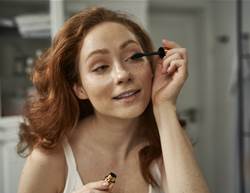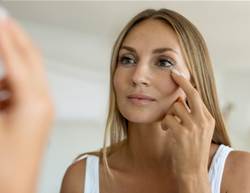Women over 40 can commonly experience dry eyes and irritation as they progress into perimenopause, according to Sophie Koh, resident optometrist for Optometry Australia. These eye issues occur as a result of tear ducts and oil glands drying out as women age and the body’s natural immune responses are less robust. Here are a few important makeup habits to avoid to protect your eyes from further damage.
ONE: Using dirty makeup brushes and applications
According to Optometry Australia’s 2020 Vision Index almost half (40%) of Australians have admitted to only cleaning their makeup tools twice a year. Makeup tools and applicators are a hotbed for bacteria and if not cleaned frequently, can cause viral, fungal, and bacterial infections. These infections can cause increased discharge and swollen or itchy eyes. Yikes!
What to do: As a rule of thumb, “makeup brushes should be cleaned weekly in warm soapy water and air-dried,” says optometrist Sophie Koh. To be extra cautious and reduce bacteria building up, it’s also recommended that you replace make-up applicators and brushes at least every six to 12 months.
TWO: Using out of date makeup products
Reports by the American Optometric Association show that half of makeup users never check the packaging regarding a product's wear time and nine in 10 women admit to using makeup that has passed its expiration date.
What to do: Makeup products have an expiration date of three-12 months once opened, and for good reason! “Using makeup passed its expiry leaves you at risk of spreading harmful bacteria into the sensitive glands around the eye,” claims Sophie Koh. Do an audit of your makeup and make a commitment to replacing the three most commonly used products in your makeup bag that are out of date.
THREE: Sleeping with makeup on
Sleeping with makeup on is another common mistake Australian’s are making. It’s a habit that leads to serious eye issues and in some cases, causes long-term eye damage or even potential blindness. “Sleeping with makeup on clogs your pores, and can result in cumulative clumps of makeup behind the eyelid that linger there for months or even years,” says Sophie Koh. This dangerous buildup of makeup can cause irritation, inflammation, and lead to serious eye infections over time. Wearing contact lenses can also cause similar issues.
What to do: It’s important to go to bed having washed your face, removed contact lenses, and cleared away all makeup from the day with a hypoallergenic wash, ensuring you’re being gentle around your eye area.
FOUR: Not checking the products’ ingredients
If you have sensitive eyes be sure to check what’s in the makeup you’re using. Makeup can contain ingredients such as lead and nickel which are the most likely culprits to cause eye infections, alongside products with fragrance. Not sure if these ingredients affect you? A sign of irritation looks like allergic reactions to the eyes, redness, an increase in discharge, swelling, itchy eyes, or crusty and sticky eyes upon waking up.
What to do: If you are experiencing any of these symptoms after using a new makeup product discontinue use immediately and give your eyes a gentle wash with luke-warm water.
FIVE: Sharing eye makeup
We’ve all done it, a friend has a really great eye shadow or an amazing mascara wand and you want to give it a try for yourself. Whilst it may be fun sharing products with your girlfriends, passing around makeup applicators is a big no go as it increases the exposure to bacteria and infection leading to eye conditions such as viral conjunctivitis and ‘pink eye’.
What to do: Always think twice when reaching for someone else’s makeup and instead, head to your local beauty counter and ask for a sample for yourself that hasn’t been contaminated.
Eye health does not just stop at fixing your makeup habits, according to Optometry Australia, the majority of Australians (77%) agree that eye examinations may uncover issues with their general health. To keep your eyesight in check ensure that you are having regular eye checks with your local optometrist to maintain a good vision for life.










